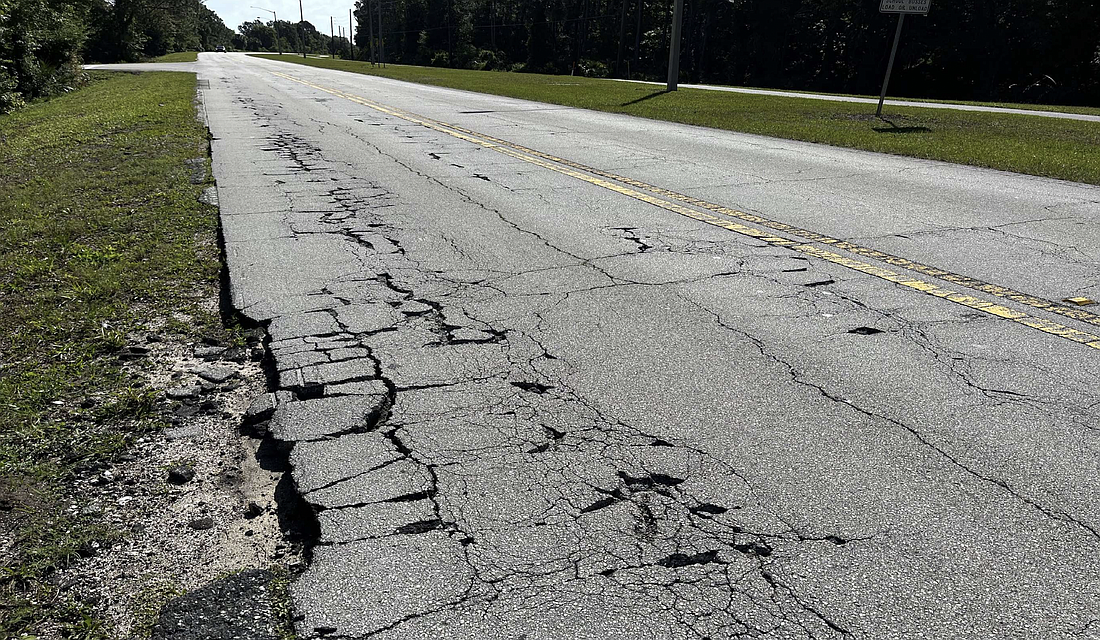- April 5, 2025
Your free article limit has been reached this month.
Subscribe now for unlimited digital access to our award-winning local news.

It will cost $12.2 million annually just to maintain Palm Coast’s roads in their current condition, a city staff member told the City Council at an April 25 workshop.
Palm Coast Stormwater and Engineering Director Carl Cote told council members that the 2023 budgeting process is at a “critical” point for the city’s roads.
But the issue of deteriorating roads — and the ever-increasing cost of fixing them — has been on the city’s radar for years.
“These roadways didn’t start to fail just in this past year or two,” Mayor David Alfin said. “This has been in process for a long time.”
Cote said the city can’t wait to address the problems, or the city will be doing “full-deck repairs” instead of just resurfacing.
“Once the roadway gets to a certain deterioration point, it deteriorates very quickly, because you have water getting through the cracks, getting into the base,” Cote said. “You have heavier vehicles that can cause additional cracking.”
Once the roadway gets to a certain deterioration point, it deteriorates very quickly. — Carl Cote, Stormwater and Engineering Director
Currently, the resurfacing program only has funding for about $2.2 million in work per year, Cote said.
If the city does not act on the problems now, he said, in five years, it will cost $52 million to bring the roads up to standard.
Transmap, a roadway data gathering and analysis company, surveyed the city’s roadways in 2017 and graded them 79 out of 100 on the Pavement Condition Index, a “satisfactory” level.
Transmap completed a second survey of the city’s roadways in October 2021.
That survey showed that the city had dropped four points on the PCI, to 75.
Cote said Transmap called the drop a “remarkable quality decrease.”
Transmap said that if the city doesn’t increase funding for road repairs, the next four years will bring a nine-point decrease in quality, Cote said.
And it will only get worse faster, he said.
“Spending money, I think, is now a good investment to avoid even more expensive repairs in the future,” Cote said.
Palm Coast has 542 miles of roadways. The new Transmap survey rated 60% of those roads as “satisfactory” and another 30% as “fair,” though some roads registered a “poor” rating — like Matanzas Woods Parkway, an arterial roadway, which rated 47 on the PCI.
Already, the city can see the impact of the degradation.
In 2021, the city had 175 work order calls for potholes.
Already in 2023, there have been 122 work order calls for potholes. Cote said the city predicts 244 call by the end of this year.
Council member Nick Klufas, who has been on the City Council since 2016, said the resurfacing program has been underfunded even since he joined the council.
It’s hard to see the issues, he said, when the roads look fine on the surface.
“During economic downturns, when you have great-looking roads, it’s very easy to not maintain the street repaving programs,” Klufas said.
The council now cannot afford further delays, Alfin said. The problem is how to pay for the dramatic increase is road work costs without placing too heavy a burden on taxpayers.
Between 2003 and 2012, the city used a half-cent fuel tax to help pay for road repairs.
Alfin instructed the city manager to reach out to the county for information on that process, but also asked staff to look for alternative funding sources.
Cote’s presentation included a few funding possibilities, including utility taxes or dedicating some ad valorem tax money to the resurfacing program. But residents are already likely to see an increase on their stormwater bills.
I think we're gonna have to make some difficult, hard choices this year. — Ed Danko, Vice Mayor
The council agreed to look at all the options first. That includes cutting “wants” in order to pay for “needs,” Vice Mayor Ed Danko said.
“I think we’re gong to have to make some difficult, hard choices this year,” Danko said. “Because we have to come up with the money ... to keep our roads good. I don’t think we have a choice.”
Your free article limit has been reached this month.
Subscribe now for unlimited digital access to our award-winning local news.